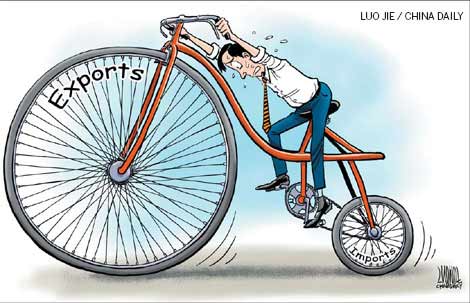Chinese companies should adjust local business plans to cope with competition from foreign firms
|
 |
Deep-seated structural problems in the process of economic globalization were the main trigger for the international financial crisis of 2008.
The financial systems of most nations were running without any supervision, while households and governments were reeling from deficits without a strong backup from the real economy. It was also the time to take a break from the voracious consumption fueled by spending borrowed money.
These structural problems are by no means over yet as it will take some time before nations can find an answer to all these problems.
One thing that is important for nations to remember while reshaping the financial landscape is to ensure that there is good coordination and cooperation between the deficit and the surplus nations and among the net debtors and net creditors.
It is important that deficit nations must enhance the competitiveness of their exports, while surplus nations must actively spur domestic demand.
However, constrained by domestic factors such as elections, political leaders of major powers shy away from the systemic issues and try to pin the blame on their foreign trading partners.
To some extent this looks like a return to the protectionist policies of the past. The main approach often in these cases is to pressure the trading partner's currency and create trade barriers for imports. The justification for such actions is often the argument that it was necessary to protect domestic products and employment.
But what these nations do not realize is that such approaches will neither change the deficit or surplus situation, nor cure the maladies of globalization. It can only lead to more trade wars and lead to a fundamental reversal of economic globalization.
These actions, if left unchecked, will inevitably interfere with or even ruin the global economy and world trade, which has just begun to show green shoots of recovery after a long hiatus.
During its 30 years of reform and opening-up, China has actively participated in the international division of labor and grown from being a small trading nation to the world's second-largest economy.
China is also one of the biggest beneficiaries of globalization. But the international community has often criticized China's growing trade surplus by saying that the nation was pursuing mercantilist policies.